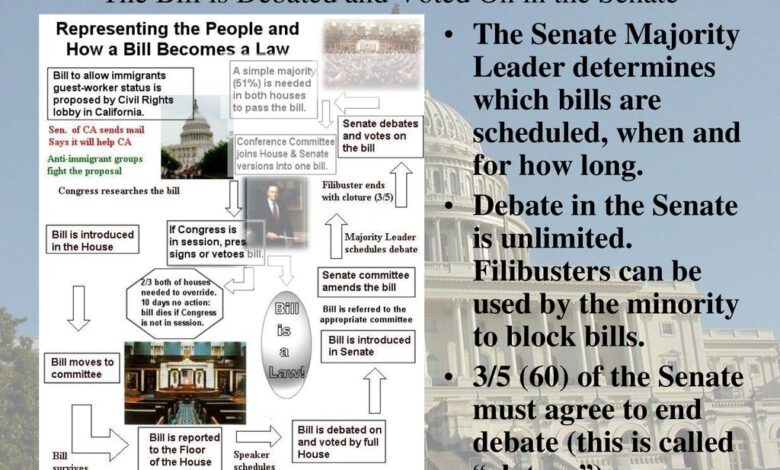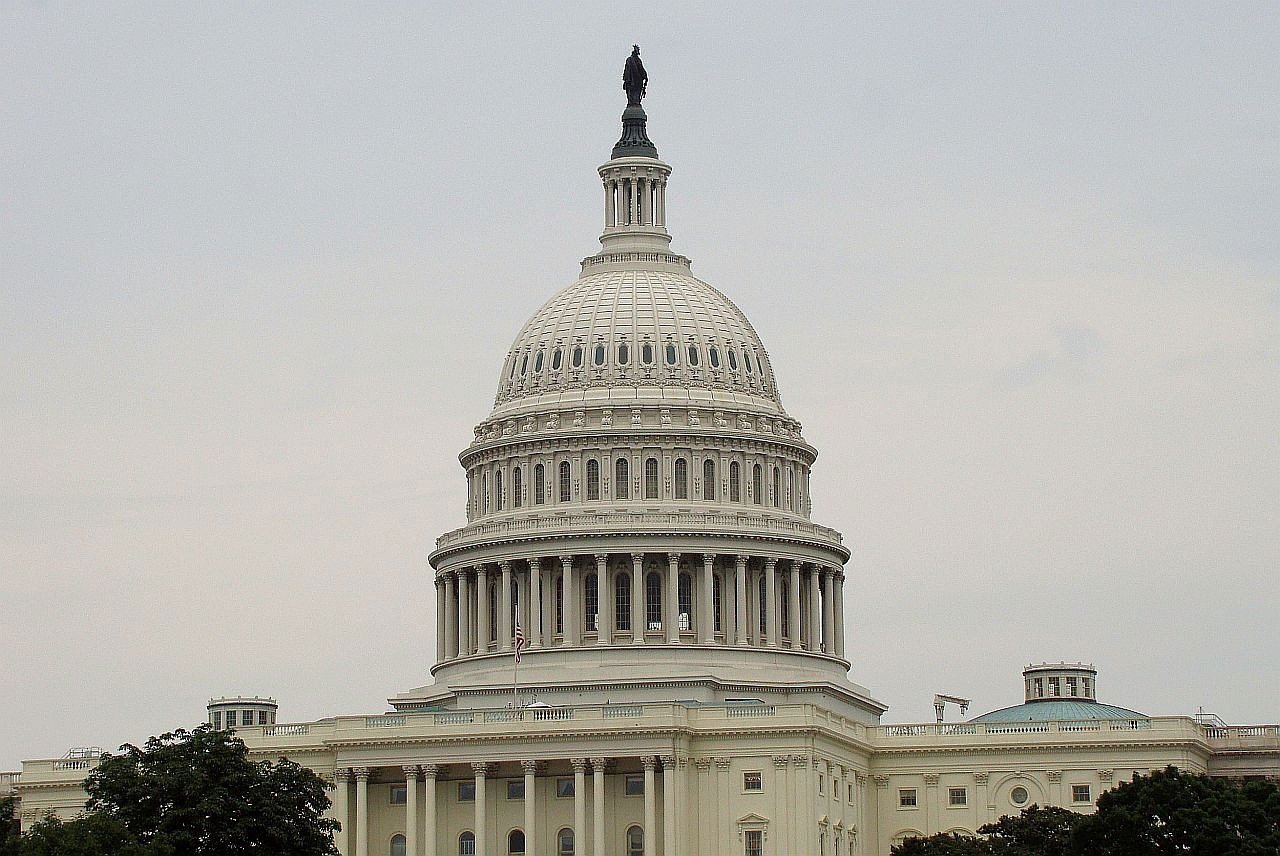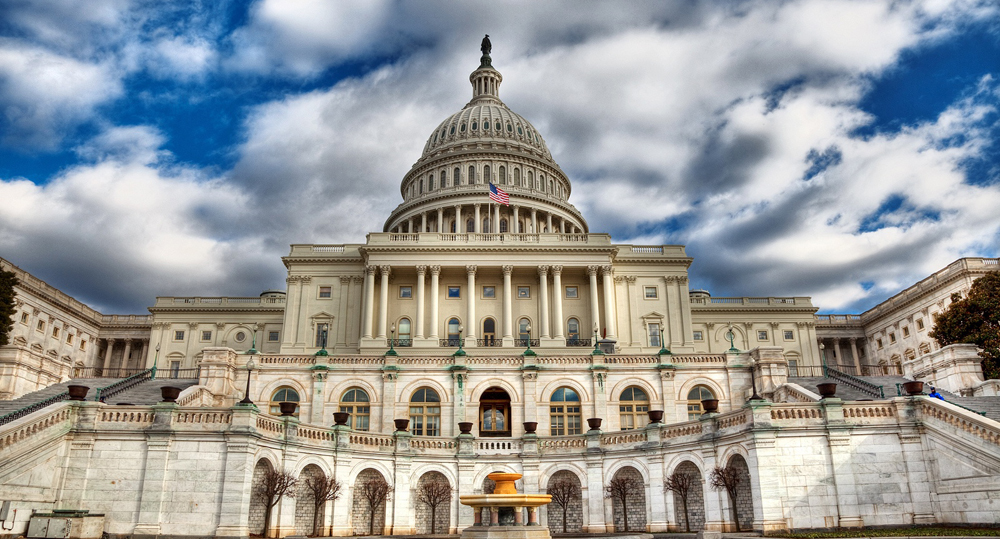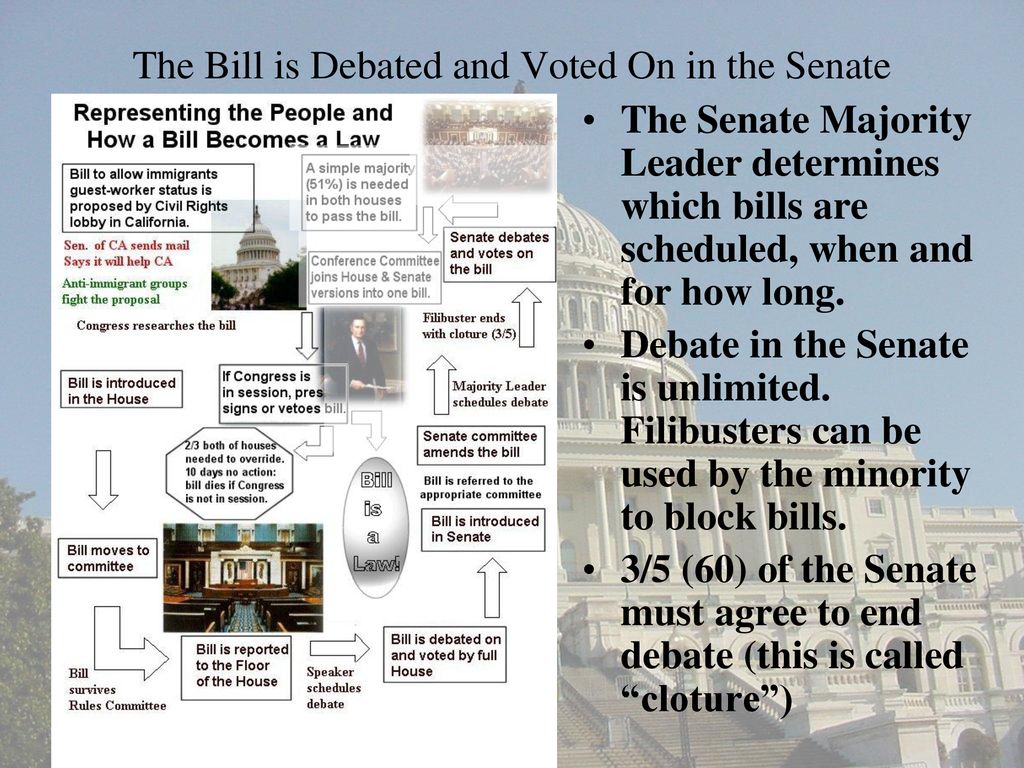
Senate Votes to Begin Debate on Bill Repealing Iraq War Authorizations
Senate votes to begin debate on bill repealing Iraq War Authorizations, a significant step in the ongoing debate about the US’s involvement in the Middle East. The move comes after years of discussions and deliberations, with both proponents and opponents of repealing the authorizations presenting compelling arguments.
This decision signifies a potential shift in US foreign policy, prompting questions about the future of US military presence in Iraq and the broader implications for the region.
The debate surrounding the Iraq War Authorizations has been a complex one, fueled by historical context, political considerations, and the evolving landscape of the Middle East. The original authorizations, passed in 2002, authorized the use of military force against Iraq, setting the stage for the US-led invasion that toppled Saddam Hussein’s regime.
Since then, the war’s legacy has been a subject of intense scrutiny, with many arguing that the authorizations should be revoked to prevent future military interventions without congressional oversight.
Historical Context of the Iraq War Authorizations

The Iraq War Authorizations, formally known as the Authorization for Use of Military Force Against Iraq Resolution of 2002 (AUMF), were a crucial turning point in American foreign policy and the history of the Middle East. These authorizations granted President George W.
Bush the power to use military force against Iraq, ultimately leading to the 2003 invasion and the subsequent occupation of the country. Understanding the origins and rationale behind these authorizations is crucial for appreciating the complexities of the Iraq War and its enduring consequences.The AUMF was passed by the U.S.
Congress in October 2002, following months of intense debate and public scrutiny. The Bush administration argued that the authorization was necessary to prevent Saddam Hussein’s regime from developing weapons of mass destruction (WMDs) and supporting terrorist groups, posing a grave threat to the United States and its allies.
The administration presented evidence, including intelligence reports and satellite imagery, suggesting that Iraq was actively pursuing WMD programs and had ties to al-Qaeda.
The Senate’s vote to begin debate on a bill repealing the Iraq War authorizations is a significant step, and it’s prompting a lot of discussion about the country’s past and present foreign policy. It’s also reminding me of the ongoing debate surrounding the COVID-19 vaccines, and the recent statement from the German health minister, claiming that they can cause permanent disabilities.
While I’m not sure how much weight to give that statement, it does raise important questions about the long-term effects of these vaccines. Ultimately, the Senate vote is a step towards accountability, and it’s crucial to consider the potential consequences of our actions, both domestically and abroad.
Arguments for and Against the Authorizations
The debate surrounding the Iraq War Authorizations was deeply polarized, with strong arguments presented on both sides. Proponents of the authorizations argued that Saddam Hussein’s regime posed a real and present danger to the United States and the world. They cited intelligence reports that suggested Iraq was actively developing WMDs and had ties to terrorist organizations.
The Senate’s vote to begin debate on a bill repealing the Iraq War authorizations is a significant step towards reassessing America’s role in the region. While the political landscape shifts, the financial world also sees major changes. HSBC, a global banking giant, has acquired the UK subsidiary of Silicon Valley Bank for the symbolic sum of £1, hsbc buys silicon valley banks uk subsidiary for 1 pound.
This acquisition highlights the ongoing volatility in the financial sector and the rapid response of major players. It remains to be seen how these events will ultimately shape the future of both foreign policy and financial markets.
They also argued that military action was necessary to remove Hussein from power and prevent him from using WMDs against the United States or its allies.Opponents of the authorizations, however, argued that the intelligence evidence presented by the Bush administration was flawed and that the war was based on false pretenses.
They pointed out that the intelligence reports were often exaggerated or misinterpreted, and that there was no concrete evidence that Iraq was actively pursuing WMDs or had ties to al-Qaeda. They also argued that the war would destabilize the region, lead to a protracted conflict, and undermine America’s credibility in the world.
Political Climate Surrounding the Authorizations
The political climate surrounding the Iraq War Authorizations was highly charged, shaped by the events of 9/11 and the subsequent “war on terror.” The Bush administration, in the wake of the 9/11 attacks, argued that the United States was facing a new kind of threat from terrorist groups and rogue states, and that a proactive approach was necessary to prevent future attacks.
This rhetoric, coupled with the perceived threat posed by Saddam Hussein, created a sense of urgency and fear that influenced public opinion and the political debate surrounding the war.The passage of the Iraq War Authorizations was a significant moment in American history, setting in motion a chain of events that would have far-reaching consequences for the United States and the world.
The decision to go to war in Iraq was based on a complex mix of factors, including intelligence reports, political calculations, and public opinion. While the war itself was ultimately unsuccessful in achieving its stated goals, it remains a pivotal event in American foreign policy and a reminder of the complexities and challenges of international relations.
The Current Debate Surrounding Repeal
The debate surrounding repealing the Iraq War Authorizations is multifaceted, with strong arguments on both sides. Proponents of repeal highlight the outdated nature of the authorizations and their potential for misuse, while opponents argue against repealing them without a clear replacement or alternative.
Arguments in Favor of Repeal
The primary argument in favor of repealing the Iraq War Authorizations is that they are no longer relevant to the current security landscape. The authorizations, passed in 2002 and 2003, were granted to President George W. Bush to authorize military action against Iraq.
The Senate’s vote to begin debate on the bill repealing Iraq War authorizations has sparked a lot of conversation, and it’s interesting to see how this plays out alongside the recent focus on the potential for a Mar-a-Lago raid for Biden, as explored in this article: why no mar a lago raid for biden.
While the political landscape is full of twists and turns, it’s crucial to remember that these decisions impact real lives and should be approached with thoughtful consideration. The Senate’s debate on the Iraq War authorizations is a reminder that the past can influence the present, and we must be vigilant in how we navigate these complexities.
Since then, the situation in Iraq has changed significantly, and the U.S. has withdrawn its troops. Critics argue that these authorizations are outdated and could be used by future presidents to justify military action without congressional approval. Another argument in favor of repeal is that the authorizations grant the president too much power and could be used to circumvent the constitutional requirement for congressional approval of military action.
The War Powers Resolution of 1973 requires the president to consult with Congress before committing U.S. forces to military action and to report to Congress within 48 hours. However, the Iraq War Authorizations could be interpreted as granting the president the authority to act without congressional approval.
Arguments Against Repeal
Opponents of repealing the Iraq War Authorizations argue that doing so would create a vacuum in U.S. policy and could hinder the ability of the president to respond to future threats. They argue that the authorizations provide a legal framework for the president to take military action in Iraq and other countries, and that repealing them without a clear replacement could leave the U.S.
vulnerable.Some argue that repealing the authorizations would send a signal to the world that the U.S. is not committed to its allies or to the fight against terrorism. They argue that the authorizations are a symbol of U.S. resolve and that repealing them would undermine the country’s credibility on the world stage.
Perspectives of Different Political Parties
The debate over repealing the Iraq War Authorizations has become a partisan issue, with Democrats generally supporting repeal and Republicans generally opposing it. Democrats argue that the authorizations are outdated and should be repealed to prevent future presidents from abusing their power.
Republicans, on the other hand, argue that repealing the authorizations would weaken the president’s ability to act decisively in the face of threats.The debate over repealing the Iraq War Authorizations is likely to continue for some time. The issue raises important questions about the role of Congress in foreign policy, the balance of power between the president and Congress, and the use of military force.
Potential Consequences of Repeal
Repealing the Iraq War Authorizations would have significant legal and political ramifications, potentially impacting the US military presence in Iraq and altering the landscape of US foreign policy. The consequences of repeal are complex and multifaceted, requiring careful consideration of the potential scenarios and their respective impacts.
Legal Implications of Repeal
Repealing the Iraq War Authorizations would have direct legal implications, potentially impacting the legal basis for US military operations in Iraq. The repeal could create legal uncertainty regarding the ongoing US military presence in Iraq, potentially necessitating a new legal framework for the deployment of US troops.
The repeal could also impact the legal basis for US military operations in other countries, particularly those involving counterterrorism efforts.
Political Implications of Repeal
The repeal of the Iraq War Authorizations would also have significant political implications, potentially impacting US foreign policy and the relationship between the US and Iraq. The repeal could signal a shift in US foreign policy, indicating a desire to reduce US military involvement in the Middle East.
It could also affect the relationship between the US and Iraq, potentially leading to increased tensions or a renegotiation of the US military presence in the country.
Impact on US Military Presence in Iraq, Senate votes to begin debate on bill repealing iraq war authorizations
The repeal of the Iraq War Authorizations could have a direct impact on the US military presence in Iraq. The repeal could force the US to withdraw troops from Iraq, potentially jeopardizing US security interests in the region. However, the repeal could also lead to a renegotiation of the US military presence in Iraq, potentially resulting in a more limited and defined role for US troops.
Potential Scenarios and Consequences
The potential consequences of repealing the Iraq War Authorizations are multifaceted and depend on a variety of factors, including the political climate in Iraq and the US, as well as the specific terms of any new legal framework for US military operations.
Here is a table outlining potential scenarios and their respective consequences:
| Scenario | Consequences |
|---|---|
| Repeal leads to US troop withdrawal | Increased instability in Iraq, potential resurgence of ISIS, reduced US influence in the region, potential loss of access to key military bases. |
| Repeal leads to renegotiation of US military presence | More limited and defined role for US troops, potential for increased tensions with Iraq, potential impact on US security interests in the region. |
| Repeal leads to legal uncertainty and ongoing debate | Continued uncertainty regarding the legal basis for US military operations in Iraq, potential for legal challenges to US military presence, potential for political gridlock. |
The Senate Vote and Its Significance: Senate Votes To Begin Debate On Bill Repealing Iraq War Authorizations
The Senate vote on repealing the Iraq War authorizations represents a pivotal moment in US foreign policy. This vote signifies a potential shift in the country’s approach to military intervention, particularly in the Middle East. The outcome of the vote carries significant implications for future US foreign policy decisions and could shape the country’s role in international affairs for years to come.
Timeline of Key Events Leading Up to the Vote
The Senate vote on repealing the Iraq War authorizations is the culmination of a long and complex process, marked by intense debate and political maneuvering. The following timeline highlights some of the key events leading up to this crucial vote:
- 2002:The Authorization for Use of Military Force Against Iraq Resolution (AUMF) is passed by Congress, authorizing President George W. Bush to use military force against Iraq.
- 2003:The US invades Iraq, leading to a protracted war that lasted for nearly a decade.
- 2011:The US withdraws its combat troops from Iraq, but retains a small military presence in the country.
- 2014:The Islamic State of Iraq and Syria (ISIS) emerges as a major threat in Iraq and Syria, prompting the US to redeploy troops to the region.
- 2015:The Obama administration authorizes airstrikes against ISIS in Iraq and Syria.
- 2016:The Trump administration expands the US military presence in Iraq and Syria, launching a campaign to defeat ISIS.
- 2019:The House of Representatives votes to repeal the 2002 AUMF.
- 2020:The Senate Foreign Relations Committee approves a bill to repeal the 2002 AUMF.
- 2023:The Senate votes on the bill to repeal the 2002 AUMF.
Public Opinion and the Debate

Public opinion on repealing the Iraq War Authorizations is a complex and multifaceted issue, influenced by various factors, including political affiliation, personal experiences, and media coverage. Understanding public sentiment is crucial to assess the potential impact of this legislation.
Public Opinion Polls
Public opinion polls provide valuable insights into the attitudes and beliefs of the American public on various issues. Numerous polls have been conducted on the issue of repealing the Iraq War Authorizations, revealing a range of perspectives. For instance, a 2023 poll by the Pew Research Center found that a majority of Americans (62%) support repealing the authorizations.
However, there are significant partisan differences, with Democrats overwhelmingly in favor of repeal (84%) compared to Republicans (36%). This highlights the strong political divide on the issue.
- A 2022 poll by the Associated Press-NORC Center for Public Affairs Research found that 58% of Americans believe the US should end its military involvement in the Middle East, with only 39% supporting continued involvement. This suggests a growing public desire for a less interventionist foreign policy.
- A 2021 poll by the Chicago Council on Global Affairs found that 63% of Americans believe the US should take a less active role in world affairs, with only 34% supporting a more active role. This trend towards isolationism further underscores the public’s desire to reduce military commitments abroad.
These polls demonstrate that public opinion on repealing the Iraq War Authorizations is not monolithic, with varying levels of support based on political affiliation and broader foreign policy preferences.
Final Wrap-Up

The Senate’s vote to begin debate on the bill repealing the Iraq War Authorizations marks a pivotal moment in the ongoing discussion about US foreign policy. This decision, while symbolic in nature, could have far-reaching implications for the future of US military involvement in the Middle East.
The debate surrounding the repeal is likely to continue, with arguments for and against the authorizations being fiercely contested. The outcome of this debate will ultimately shape the US’s role in the region for years to come.






